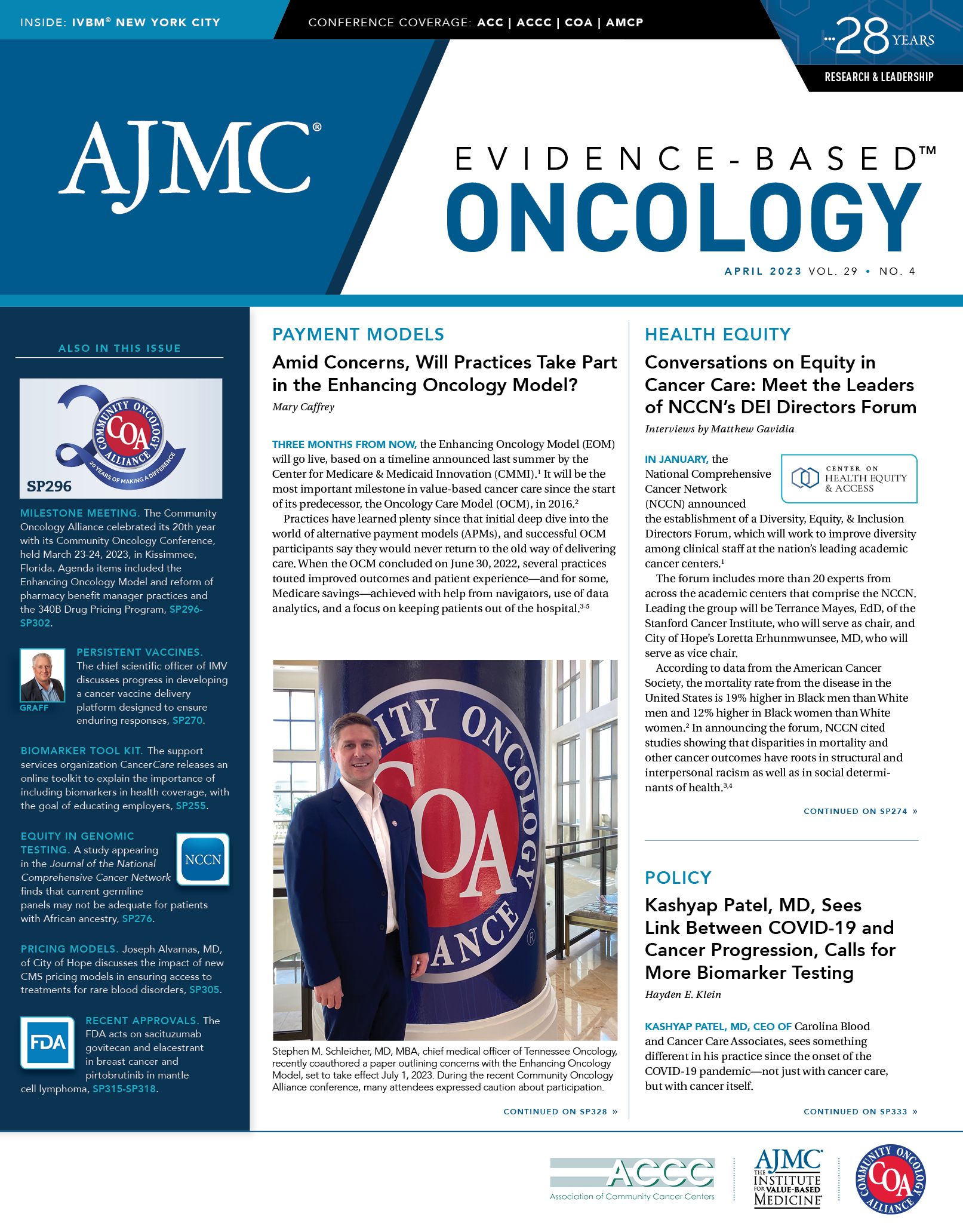- Center on Health Equity & Access
- Clinical
- Health Care Cost
- Health Care Delivery
- Insurance
- Policy
- Technology
- Value-Based Care
Sintilimab Plus Bevacizumab Biosimilar Improves Response Rates, Depth of Response in HCC
Compared with sorafenib, a combination of sintilimab and a bevacizumab biosimilar improved responses in patients with unresectable hepatocellular carcinoma (HCC).
Combining sintilimab and a bevacizumab biosimilar (IBI305) improved the objective response rate (ORR), time to response (TTR), duration of response (DOR), and depth of response compared with sorafenib with tolerable and manageable adverse events of special interest (AESIs) in patients with unresectable hepatocellular carcinoma (HCC). The results were presented in 2 abstracts at the 2023 American Society of Clinical Oncology Gastrointestinal Cancers Symposium, held January 19-21, 2023, in San Francisco, California.
The ORIENT-23 trial (NCT03794440) assessed sintilimab plus IBI305 as a first-line treatment for unresectable and found the combination therapy significantly improved both overall survival and progression-free survival. Sintilimab is a PD-1 inhibitor and IBI305 is a vascular endothelial growth factor inhibitor, while sorafenib is a kinase inhibitor.
One abstract reported updated results for ORR, TTR, DOR, and depth of response,1 which was defined as the minimum percentage of the sum of the longest diameter change and longest diameter change described as mean (SD). There were 571 patients randomized 2:1 to receive sintilimab 200 mg intravenously every 3 weeks plus IBI305 15 mg/kg intravenously every 3 weeks or sorafenib 400 mg orally twice a day. Patients remained on treatment until their disease progressed or they experienced unacceptable toxicity.
The median follow-up time was 26.7 months and the ORR for the combination was 21.0% vs 4.7% for sorafenib, according to Response Evaluation Criteria in Solid Tumors (RECIST) version 1.1, and 25.1% vs 7.7%, respectively, according to the HCC-modified RECIST.
The updated results found for the combination therapy:
- Median TTR was 2.8 months per RECIST 1.1 and 2.6 months per mRECIST
- Median DOR was 10.3 months per RECIST 1.1
- The minimum percentage of sum of longest diameter change was larger in the combination vs sorafenib (–13.4% [35.8] vs 3.2% [26.5] per RECIST 1.1)
- The longest diameter change in the largest liver lesion was –27.6% (31.6) for the combination vs –11.5% (20.9), per RECIST 1.1
The second abstract focused specifically on AESIs with the same median follow-up of 26.7 months.2 In the combination therapy group, 77.9% of patients experienced any AESI compared with 53.3% of patients in the sorafenib group. In the combination therapy group, 31.3% had treatment-related grade 3 or AESI and 13.9% had treatment-related serious AESI compared with 13.0% and 4.9% in the sorafenib group.
The most common AESIs were proteinuria (61.7% combination vs 28.8% sorafenib), hypertension (41.8% vs 22.3%), hemorrhage (15.4% vs 9.2%), and hyperthyroidism (14.2% vs 11.4%). Overall, the AESIs of the combination were considered manageable and tolerable, and the incidence and severity of AESIs were consistent with safety profiles of sintilimab and IBI305 individually.
“In the characteristics of baseline, ages can be a predictor of the onset of proteinuria, hypertension, and hyperthyroidism,” the researchers wrote. “In addition, the occurrence of proteinuria and hypertension can be a predictor for a better survival.”
References
1. Ren Z, Xu J, Bai Y, et al. ORIENT-32: Updated characterization of response to sintilimab plus bevacizumab biosimilar (IBI305) vs sorafenib for unresectable hepatocellular carcinoma. Presented at: 2023 ASCO GI Cancers Symposium; January 19-23, 2023; San Francisco, CA. Abstract 570. https://meetings.asco.org/abstracts-presentations/215648
2. Ren Z, Xu J, Bai Y, et al. Report of adverse events of special interest (AESIs) for sintilimab plus a bevacizumab biosimilar (IBI305) in unresectable hepatocellular carcinoma. Presented at: 2023 ASCO GI Cancers Symposium; January 19-23, 2023; San Francisco, CA. Abstract 530. https://meetings.asco.org/abstracts-presentations/215646

